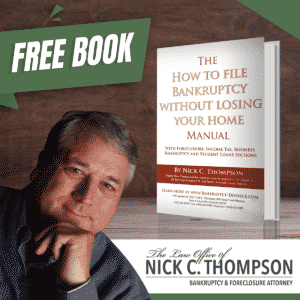When a person is sued with a debt collection lawsuit or foreclosure proceedings, the debtor is tempted to call in an attempt to stop or settle a debt. You are always greeted with a statement that the debt collectors are recording the call for “quality control purposes.” Then they give the standard disclaimer that the debt collector will use any information to collect the debt. Most people expect to work out the problem with a debt settlement. However often you end up getting sued while in debt settlement. It is called dual tracking, where they sue you for the full amount while negotiating.
Kentucky has a 15-year and 10-year statute of limitations for a contract. If the item is a negotiable instrument, the statute of limitations is a 6-year rule. The debt is a negotiable instrument if the loan was transferred or sold.
When you pick up the phone and admit you owe the debt, the clock starts back over. Any admission or payment restarts that 15 or 6-year statute of limitations all over again. Sure they want to talk to you.
Please speak clearly into the microphone and make your admission that you owe the debt and have not paid. We will be happy to take a small payment from you and collect this debt for another 15 years plus interest.
Information the Debt Collector Provides
The debtor may think that the debt collector, attorney, or law firm will provide helpful information. Nothing is further from the truth and reality. The attorney or debt collector sues to collect the unpaid debt or foreclose.
They do not work for you and can often offer misinformation or information that helps them. They never provide information that helps the debtor, like how to file bankruptcy properly or how to sue the bank.
If they offer a solution such as a mortgage modification or work-out agreement, they suggest those options because these options make them even more profit. If it is a mortgage, it will often allow the company to take equity from your home.
We will discuss debt settlement over credit card debt and foreclosures and getting sued while in debt settlement.
Your Debt Settlement Offer
There are very few debt settlement agencies that you or an attorney can not do. After the lawsuit is filed, debt collectors will usually work with you and accept an offer for a debt settlement. The proposal has to be attractive enough for them to take it.
There is no reason to accept your offer if it does not make them a profit. If you are negotiating a foreclosure, their goal will be to get the mortgage out of default and to make a profit. The servicer is always interested in making another fee.
Most debt settlements are in the 70% range. If the offer is below 70%, the debt collectors will typically want reasons for settlement, such as the debtor being almost uncollectible. For instance, the customer may be on social security with no assets.
After debt collection complaints are filed, the lawyer will often get paid a percentage of what the law firm will collect. These percentages range from about 40%, or the law firm will work on a discounted per-hour fee. If the decision has been made to file a lawsuit, the company has typically found assets or garnishable wages.
Debt Settlement Agencies and Debt Settlement Programs
Hiring a debt settlement agency after a lawsuit is almost always a mistake. They cannot go to court and represent you. The debt settlement agency makes a profit from your payments to the creditor, so they will only offer to talk to the debt collectors.
By law, they cannot represent you in court, and they cannot offer you legal advice. If you have been sued in Kentucky, you must file an answer to the lawsuit within 20 days or risk losing by default judgment.
You can talk all you want, but a debt collection lawsuit will go forward while you are talking. The only exception to this is foreclosure. Suing you while speaking settlement is called dual tracking.
This practice was so common with debt collectors that it was made illegal for mortgages. People tend to negotiate or litigate. They rarely think in both modes. With an unsecured debt settlement, the debt collector will often talk about settlement while he proceeds with the debt collection lawsuit.
The Debt Settlement Agency Defined
Debt settlement agencies are supposed to work for you, but they often only take the money you pay them and do very little real work. Kentucky law defines a debt settlement agency as:
Statute: Ky. Rev. Stat. §380.010 et seq.
Definition: “Debt adjuster” means a person engaged in the business of debt adjusting. “Debt adjusting” means doing business in this state in debt adjusting, budget counseling, debt management, debt modification or settlement, foreclosure assistance, or debt pooling service, or holding oneself out as acting or offering or attempting to act as an intermediary between a debtor and their creditors for a fee, contribution, or other consideration, or by words of similar import, as providing services to debtors in the management, settlement, modification, or adjustment of their debts, to do any of the following:
(a) Effect the adjustment, compromise, settlement, modification, or discharge of any account, note, or other indebtedness of the debtor;
(b) Receive from the debtor and disburse to the debtor’s creditors any money or other thing of value; or
(c) Solicit business and advertise as a debt adjuster
The Reason Kentucky Defined Debt Adjuster and Debt Settlement Agencies
The CFPB Consumer Financial Protection Bureau and Kentucky define and regulate debt settlement agencies because of the high fees debt adjusters charge to debtors and the lack of any substantial benefit they often provide. Tax Masters, Ameridebt, and other debt settlement companies have been shut down due to the massive fraud. They often over-promise results and do not deliver the results.
You usually want an attorney to negotiate the debt. The Debt collector records your conversation and then uses it against you in court. Using an attorney trained and experienced in dealing with a debt collection lawsuit prevents you from accidentally making admissions.
Often when you attempt to do this yourself, the debt collector or his attorney will ask questions merely to find out where you work and your bank account. Later, a bank or wage garnishments can be issued, or your home may be attached with a judgment lien.
Why Does the Attorney-Client Relationship Protect and Provides Protection?
A bankruptcy attorney normally doesn’t just file bankruptcy cases. Along with filing for bankruptcy, we negotiate with creditors every day. We practice law involving debt problems and are not judgmental. We know the court system in this area in and out. Dealing with debt problems is our bread and butter.
I will not say that debt collectors fear us but the credit card company and the debt collector has some respect for us. If negotiations fail, they know we are familiar with filing bankruptcy and giving the debt collector nothing. Filing bankruptcy may not be what you want to do, but in this world, you want more options, not less. Not suing the bank back with counterclaims, having legal advice, or the bankruptcy option means your settlement will cost more.
Dealing with a debt collector is stressful. It is probably far better to work a little overtime than to settle a debt when you normally don’t work in this area.
The Original Creditor Credit Cards and the Debt Buyer
A Credit card obligation is almost always a negotiable instrument that can be sold to a debt buyer. If the original creditor does not keep the debt, you may not recognize who is suing you. You can send a debt validation letter to the debt collector even if the lawsuit has not been filed yet. A debt validation letter, at the least, will verify whether you owe the debt and whether they have the wrong person.
The goal is to avoid wage garnishment often by proposing a payment plan by making monthly payments. They will take a lump sum payment, almost always less than making payments. But the lump sum payment will almost always be payable within 60 days of the settlement offer being accepted.
These settlements offered by the bill collectors will almost always be an agreed order, allowing the debt collector to immediately execute a default or summary judgment if the monthly payments are missed.
Debt Consolidation and Credit Card Companies
Paying off credit card companies with debt consolidation is an option if you have multiple lawsuits. Credit card companies charge high rates, which eventually are impossible to pay.
Debt consolidation loans or debt consolidation agencies will claim they are more affordable. The interest rates drop, but often they only temporarily give you relief. You still have to pay the face value of the debts. You cannot afford to pay the new loan if you don’t have the money.
They forget these details, and eventually, you have traded one creditor for several others. You need a viable option when looking at a court date and a possible summary or default judgment.
The Bankruptcy Option cures Getting Sued While in Debt Settlement
When you are in a state civil court action, they will issue a judgment even if you are judgment proof and have no assets to collect from. Later, if you inherit a home or acquire assets, these assets will be attached to pay for the debt.
Bankruptcy is often cheaper and quicker than people’s other methods. It is also often better for your credit score.
Regardless of your financial situation, you are far better off in bankruptcy court, where the judges are more debtor-friendly, and assets can be better protected. A bankruptcy case allows you to manage other debts and avoid having your wages garnished while the automatic stay order protects you.
Other collection efforts are used to collect legally, but wage garnishment is the most common method creditors use to collect debts. When working with a debt collector becomes impossible, Bankruptcy terminates the credit card obligation and provides complete debt relief.
The Benefits of the Chapter 13 Bankruptcy Option
Your bank account, real estate, and other assets are not at risk in a Chapter 13 bankruptcy. There is rarely any liquidation of assets in a Chapter 13 plan, but a plan can include liquidation if you want it.
If you stop paying a debt, state law allows you only a few options for working with debts. You can not force a debt to take a settlement offer. Medical bills and other creditors will go to court and attach money directly from bank accounts. But with unsecured debts, you can force the creditor to take your offer in a Chapter 13 bankruptcy.
You may want to pay if you owe the debt. But you have to have an affordable plan. Chapter 13 bankruptcy stops collections with a federal court order called the automatic stay, which will be in effect for 3 or 5 years.
Chapter 7 Bankruptcy and Filing for Bankruptcy
You typically pay zero back to creditors in a Chapter 7 bankruptcy, but you can lose property you can not exempt. You keep more property in Chapter 7 than if debt collection in state court ends in a default or summary judgment. The state court exemptions that allow you to keep property are smaller than the bankruptcy exemptions.
In either form of bankruptcy, you must use an approved certified credit counselor to obtain a credit counseling certificate. This has to be done before filing bankruptcy. But debt collection ends. You can voluntarily pay a debt collector after you get a discharge, but they cannot ask you to pay.
Chapter 7 means you get your terms with credit card companies, and any default judgment or payment plan you agreed to becomes unenforceable. Both versions of bankruptcy provide you with the debt relief you need and deserve.
So Why Use a Bankruptcy Attorney?
A bankruptcy lawyer, as we said, offers you the legal advice you don’t get from a debt collector. Collectors use the emotions of shame, blame, guilt, and fear to manipulate people to pay the debt.
A Bankruptcy lawyer will give you a free consultation and the legal information you need to make intelligent decisions. Your decision must be logical and in your family’s best interest. It should not be an emotional decision.
He knows how to deal with these collectors and negotiate with them. If they attempt to litigate and negotiate at the same time, he can do it. He was trained to practice law in this area.
Even if you are judgment-proof, a creditor can affect you. Debts such as child support, tax, or student loan debt can garnish your social security benefits. An unpaid car accident will cancel your driver’s license. And just the emotional stress will affect your health.
Our Bankruptcy Law Firm
Our law firm has handled debt collection lawsuits, foreclosures, and bankruptcy cases since 1988. We have helped thousands of homeowners and clients settle debts, and we have also litigated cases in state court when it was necessary.
You should be the one who is dual tracking, not the debt collection attorney. We can sue debt collection companies back. Should you choose to file bankruptcy, we will use the automatic stay to ensure you are protected. If you want to settle the case, you can also use us for negotiation. Therefore, do not hesitate to contact us anytime!
Resources for Bankruptcy
Louisville, Kentucky Bankruptcy Forms
Benefits of a Chapter 7 Bankruptcy • Video
What is the Student Loan Brunner Test?
Filing Chapter 7 & Chapter 13 Bankruptcy
Student Loan Bankruptcy Qualifications
Chapter 11 Business Bankruptcy Information
If you are considering bankruptcy, don’t delay because timing is crucial. I am here to help you. So, contact my office immediately to start the conversation—Nick C. Thompson, Bankruptcy Lawyer: 502-625-0905.










